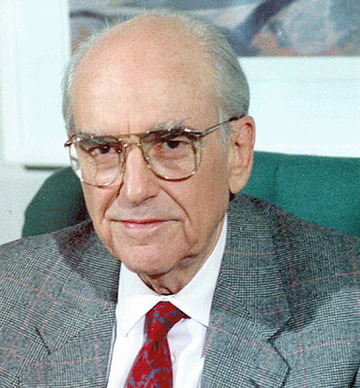Also known as:
Antreas Papandreou, Ανδρέας Παπανδρέου
More People of Greece
More Topic Categories
Related Destinations
Andreas Papandreou (05/02/1919 - 23/06/1996)
 Andreas G. Papandreou was a Greek politician, founder of the PASOK political party and Prime Minister of Greece during the periods 1981-1989 and 1993-1996.
Andreas G. Papandreou was a Greek politician, founder of the PASOK political party and Prime Minister of Greece during the periods 1981-1989 and 1993-1996.Born in the island of Chios on 5 February 1919, he was the son of George Papandreou (Senior), who was also Prime Minister of Greece. After completing his secondary education at Athens College, a private school, he studied at the Law School of the University of Athens, where he was enrolled in 1937. However, in 1939, during the Metaxas dictatorship, he was arrested but was allowed to leave the country and move to the USA. Continuing his studies, he completed a PhD in Economics from Harvard University in 1943, and voluntarily joined the US Navy. Afterwards, he became assistant and later associate professor at various universities, including Harvard, Minnesota, Berkeley, Stockholm and York.
Returning to Greece in 1961, he became the President and Director of the Economic Research Centre of Athens, as well as Advisor of the Bank of Greece. He was elected member of the parliament in 1964 for the first time, under the Centre Union party, and soon became assistant Prime Minister at his father’s government.
During the Regime of the Colonels, he was incarcerated but was allowed to leave the country after pressure by various American academicians. He went to Sweden with his family, where he was offered professorship at Stockholm University. During his exile, he also founded the Panhellenic Liberation Movement (PAK), trying to increase awareness and opposition to the Greek regime. Although he had earlier bonds with the USA, he became increasingly critical of the US government, as he believed that CIA was responsible for the coup in Greece.
After the restoration of democracy in 1974, Papandreou returned to Greece and formed the Panhellenic Socialist Movement party, PASOK, along with many of the PAK members. After two unsuccessful elections, he managed to obtain victory during the 1981 elections, over the conservative New Democracy party. He immediately carried out a wealth redistribution program, increasing the wages and pensions of the lower classes, and introduced new liberalizing laws. The opposition highly criticized his policies, especially the increase in the number of civil servants and the general increase in public expenditure, while the supporters said these expenses were more than necessary to create a (rudimentary) welfare state. Numbers show that during the period 1981-1989, although the living standard and the per capita income increased, the growth rate not only decreased but was in fact reversed. However, during his second period in office (1993-1996), the growth rate was much improved, as fiscal policies were abandoned.
In November 1995, he was admitted to hospital, as the political tension of the past years as well as accusations that he was involved in an economic scandal a few years earlier caused his health to suffer. He died on 23 June 1996 after a severe ischemic attack.
See Also:
 Athens Photos
Athens Photos
 Santorini Photos
Santorini Photos
 Crete Photos
Crete Photos
 Meteora Photos
Meteora Photos
 Corfu Photos
Corfu Photos




